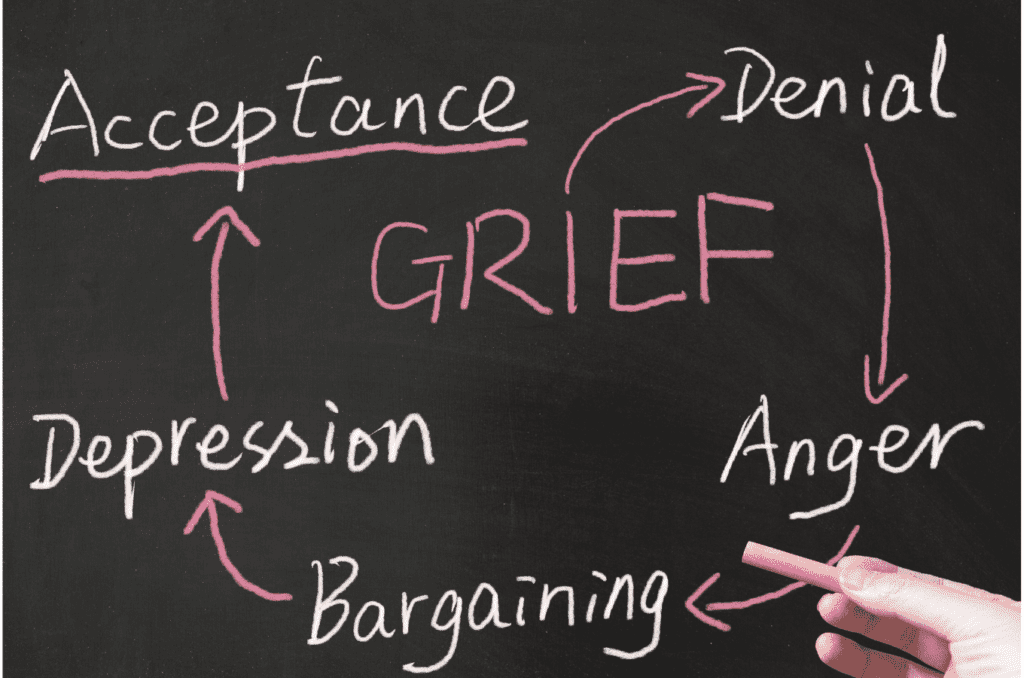
By John Mysz, LCSW –
We’ve all heard about the stages of grief – denial, anger, bargaining, depression, and acceptance.

John Mysz, LCSW
But what happens when we never quite get to true acceptance?
What if we don’t integrate the loss and continue moving forward?
In my clinical experience, I’ve seen many people who experience a difficult or traumatic loss cycle through the other stages at varying speeds. Often, there’s a lot of bargaining (What if I…? I should have… If I could go back…) which often leads to depression and/or anger and then back to bargaining. It’s a vicious, seemingly never-ending cycle that many fall victim to.
But what makes a loss traumatic and what can we do if we experience something like this?
One of the hardest things to understand about trauma is that it’s a purely subjective experience. While many assume trauma must mean you have endured a terrifying natural disaster, an assault, or a near-death experience, research is clear that trauma is in the eye of the beholder. This means that two people can go through an objectively similar loss but experience them completely differently. One may feel like they’ve lost their pet, while another feels they’ve lost their world. Unfortunately, many people do not understand this, and often those who are struggling feel judged for grieving the way that they are.
In uncomplicated or non-traumatic grief, there is pain that accompanies the loss: Sadness, feeling the loss in the physical space (beds, living areas, noise level), and some isolation among other symptoms. However, with some time, memorialization, and support, this pain of grief slowly subsides and the griever is able to integrate this loss into their lives and move forward. There is often growth from this grief such as learning more about themselves, their compassion and personal strength, a greater appreciation for life, and possible spiritual growth.
However, in more traumatic or complicated grief, suffering accompanies this pain. The difference between pain and suffering is that pain is inevitable in life – It occurs whenever something bad happens and it’s the immediate negative emotions that are triggered by the event. Emotions such as sadness, anger, and frustration are all part of the pain.
 Suffering, on the other hand, is often something that we internally create. It’s the secondary emotions such as guilt, shame, and paranoia that come from unproductive thought patterns. The problem with suffering is that it can be much more difficult to endure and can create longer-lasting psychological distress. This suffering results in trauma symptoms, similar to Post Traumatic Stress Disorder which can include flashbacks, intrusive thoughts and images, and clinical depression and/or anxiety.
Suffering, on the other hand, is often something that we internally create. It’s the secondary emotions such as guilt, shame, and paranoia that come from unproductive thought patterns. The problem with suffering is that it can be much more difficult to endure and can create longer-lasting psychological distress. This suffering results in trauma symptoms, similar to Post Traumatic Stress Disorder which can include flashbacks, intrusive thoughts and images, and clinical depression and/or anxiety.
Already in my practice, more than half the people I’ve spoken to after their pet’s passing explained to me that not only do people, places, and noises remind them of their loved one but that they have intrusive images and flashbacks surrounding their death that occur randomly. They say they’re unable to get out of bed, unable to shower or feed themselves and feel like they’ll never return back to their normal life.
For many of them, flashbacks are the most distressing to them, and understandably so. Flashbacks can occur seemingly with no trigger and in any location, and bring you right back to the moment you find the most terrifying or depressing. Flashbacks are also often entirely new for people and they don’t understand why they’re happening: “I’m going crazy,” “I’ve lost my mind”. This symptom is a rather classic part of PTSD and there is a neurological reason behind this.
 In somewhat simple terms, the brain’s memory system is split into two functions: One is to basically record what is happening in the current moment and the other is to file it away into our longer-term memory. However, in traumatic moments and throughout the duration of any PTSD or traumatic grief, our brain shuts down any biologically unnecessary functions during stressful moments, including the second function of the memory system. This is a part of our fight/flight/freeze response.
In somewhat simple terms, the brain’s memory system is split into two functions: One is to basically record what is happening in the current moment and the other is to file it away into our longer-term memory. However, in traumatic moments and throughout the duration of any PTSD or traumatic grief, our brain shuts down any biologically unnecessary functions during stressful moments, including the second function of the memory system. This is a part of our fight/flight/freeze response.
While this response is briefly necessary in life-endangering scenarios, it can often remain activated for long periods of time, or be randomly activated, due to trauma. This then leaves whatever that most distressing moment was not quite being filed into our long term memory. These traumatic moments are then easily brought to the forefront of your mind, making it feel as if it’s happening right now rather than in the past. More frequently than not, these flashbacks are brought on my identifiable triggers; however, it can be very difficult to identify these triggers and desensitize yourself to them.
So what can we do about traumatic grief and its painful and enduring symptoms?
First, allow yourself to accept the fact that it is a very common response to loss, especially if the loss was unexpected or sudden. However, that is not a requirement – the trauma is subjective, meaning if you feel the loss and have these symptoms, it was a traumatic loss.
Second, there is a plethora of help available, so seek out counseling. There are things you can do on your own time to help with trauma, but sometimes symptoms can become worse for a short period of time as you work on them before getting better and it is best to have a professional to guide and support you through it. Each individual is unique in their experience and you may need a specific type of therapy for your trauma. See my resource page for a starting point or check with your insurance to find a nearby therapist.
Third, find your support systems and coping skills – Yoga, mindfulness/meditation, and exercise are all great ways to get your body to activate and relax on your terms rather than letting the trauma drive you. Journal your experiences and try to identify your triggers. See below for some more education and suggestions on how to identify and cope with trauma.
Dealing with Pet Loss Flashbacks
Disenfranchised Traumatic Pet Loss
Why Losing Your Dog Can be as Traumatic as Losing a Relative
